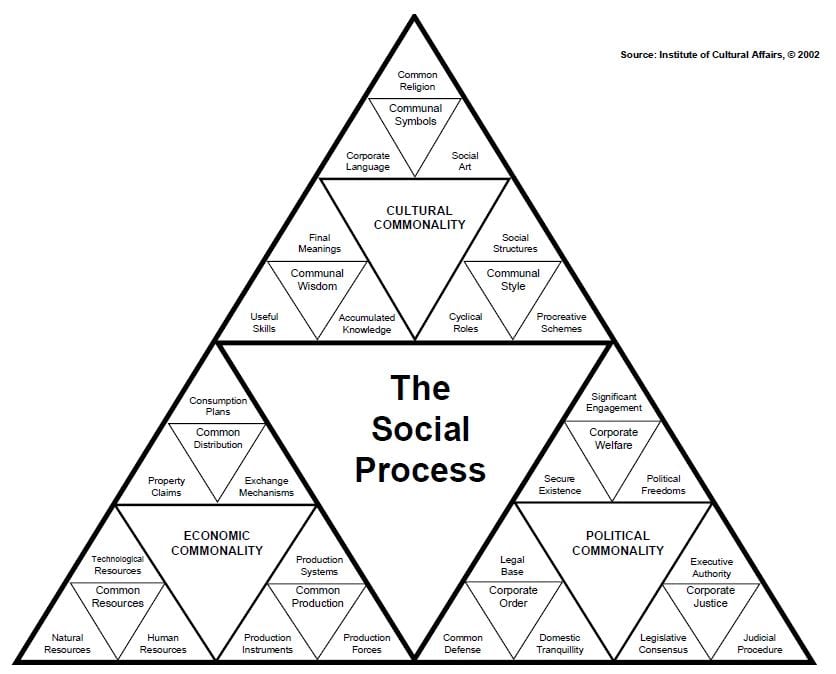By Jonathan Dudding
We often get asked what “ICA” stands for, and the answer is often a surprise to people, partly because there are a lot of “ICAs” around (Institute of Chartered Accountants, Institute for Contemporary Arts, International Compliance Association, the list goes on) and partly because the “Institute of Cultural Affairs” does not necessarily conjure up an image of an organisation focused on transformation, participation and facilitation.
The origins of the name lie in the extensive research that was carried out in the 1960s and 70s, using social process triangles to identify and understand the processes and dynamics that combined to shape the nature of society. At the highest level, the economic, political and cultural were identified as the three key dynamics which, in order for a society to be in balance, needed to carry equal weight and influence:

The economic or Foundational dynamic, containing the means by which humanity sustains itself (e.g. Resources, Production and Distribution)
The political or Ordering dynamic, which reflects the ways in which we organise ourselves (Welfare, Justice and Order), and
The cultural dynamic, wherein lies humanity’s Wisdom, Symbols, and Structures and which is seen as giving Meaning to both the other two.
The findings at that time were that the cultural, although the dynamic that gives meaning to everything else was also the weakest, and that too often decisions were being made and priorities established without sufficient consideration of the very culture that gives context and meaning.
So the Institute of Cultural Affairs was named and established to strengthen the cultural dynamic in society, to work towards a greater balance within the social process and to focus on “the human factor in world development”. As ICA International wrote in 1996 “For us, ‘culture’ is a practical reality – the images, patterns and shared understandings which allow us to do something together. At the heart of ICA’s work is the conviction that long-term, sustainable development happens only when people grasp the significance of their own lives in the larger scheme of things when they actively participate in the changes taking place around them instead of merely being targets of that change”.
It was in that context that the set of group facilitation methods and tools, now known as the Technology of Participation, was developed and subsequently used across the world.
Sadly, the imbalance that was identified 30-40 years ago still prevails in society today. Still the “cultural” dynamic is too often given insufficient weight when decisions are being made, whether that is at the international, national or local level, within companies or communities.
As Dr Mark Carney highlighted during the recent BBC Reith Lectures (themed around “How we get what we value”) a more inclusive and comprehensive approach is needed: “We need to promote the values of responsibility, solidarity, integrity and prudence as best we can through pay, through codes and regulations, while recognising that these can only be fully lived through culture and practice. So, while authorities must continue to put in place the infrastructure to make markets work, there is no simple unifying formula to break the destructive cycle of financial history. Physics won’t save finance. Promoting a system in which all its’ participants live society’s core values will.”
So it feels that ICA’s work is as important today as it was when we first started, continuing to strive for a world in which humanity thrives, supported by systems, models and processes which support us and reflect our deeper experience and wisdom.
